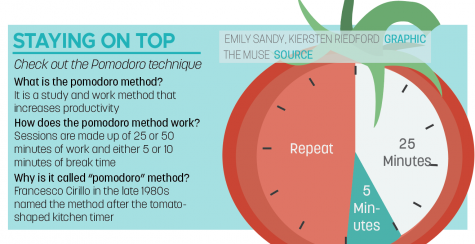For sophomore Tatum Siebert, staying motivated is an important goal in her everyday life. As a hybrid student and a self-proclaimed “people-person,” Seibert said virtual days often unmotivate her from doing her school work.
“When it’s like this assignment is due at 5 pm, well it’s like I’m not gonna see anyone, and those are just pixels on a screen. I mean it says late but does it really mean anything? Versus when it’s in person and I feel like there are actual expectations from me and it feels a lot different,” Seibert said.
Along those lines, mental health counselor Rob Kern, said overall he has seen decreasing motivation in students, with social interaction limited and a great portion of daily life is conducted online.
“There is greater confusion and oftentimes less clarity about educational goals with virtual education,” Kern said. “Families are being forced to re-navigate how to structure at-home learning, which often results in students feeling pressure.”
Seibert said by interacting with people over the phone or through a call, she has helped retain some of the social atmosphere that comes with school.
“(I try) to do things with friends, and working on things together kind of grounded me and it was like ‘well I can’t go on instagram or my phone because I my friend’s doing it too’ so then we’d both kind of keep each other motivated,” she said.
However, Seibert said it does not always work to keep herself motivated.
“In November of 2020, it was really difficult. I felt like I was just kind of getting burned out. I tried so many things to make things easier or be more motivated but it felt like there was no end in sight, especially with COVID, I just felt alone.”
 Kern said feeling unmotivated is often inevitable, especially as life during COVID brings its own set of unique issues.
Kern said feeling unmotivated is often inevitable, especially as life during COVID brings its own set of unique issues.
He said, “Motivation is a combined issue of our conscious and subconscious. It is not as easy as ‘flipping a switch’ and suddenly feeling motivated. As such, chasitizing ourselves for not feeling motivated will not suffice. Instead, as we treat ourselves with compassion we become self-advocates.”
But not all students have struggled. Junior Bill Qian said he has not felt unmotivated from moving to a virtual schedule.
“There have definitely been times where I’ve felt like I just really don’t want to be here, but I think that has more to do with school than with transitioning online,” Qian said. “But honestly, sometimes it’s nice to get a break from constant school, and it eases the pressure of having school work.”
He said while social interaction was necessary to motivate him, he said that staying motivated by organizing his workload and prioritizing the things he needed to get done.
He said, “I basically planned out my entire month to prepare me for my assignments and everything I needed to get done so I had a visual of what I needed to get done. Checking things off was satisfying every time and I started getting things done and planning ahead more.”
Kern said he agreed there were a variety of techniques to stay motivated during periods where one feels unmotivated.
“When a task begins to become bothersome, our increasing frustration or exhaustion can get our attention,” Kern said. “We then take a step back to carefully reconsider how best to proceed.”
Ultimately, Siebert said she could see some positives that came from going virtual, especially as she said she had more time for introspection and thinking about her future.
“In relation to motivation, I know that my worth is not just my grades, my worth is not just how I look,” she said. “There are so many things to me that are more than just what college I get into and that has been really motivating. Because we aren’t always with other people, I appreciate the interactions a lot more. I appreciate the little things more.”
Click here to read a column about having a united student body although students remain virtual.
Click here to read a story about the social aspects while being virtual and hybrid.
































![What happened to theater etiquette? [opinion]](https://hilite.org/wp-content/uploads/2025/04/Entertainment-Perspective-Cover-1200x471.jpg)














































![Review: “The Immortal Soul Salvage Yard:” A criminally underrated poetry collection [MUSE]](https://hilite.org/wp-content/uploads/2025/03/71cju6TvqmL._AC_UF10001000_QL80_.jpg)
![Review: "Dog Man" is Unapologetically Chaotic [MUSE]](https://hilite.org/wp-content/uploads/2025/03/dogman-1200x700.jpg)
![Review: "Ne Zha 2": The WeChat family reunion I didn’t know I needed [MUSE]](https://hilite.org/wp-content/uploads/2025/03/unnamed-4.png)
![Review in Print: Maripaz Villar brings a delightfully unique style to the world of WEBTOON [MUSE]](https://hilite.org/wp-content/uploads/2023/12/maripazcover-1200x960.jpg)
![Review: “The Sword of Kaigen” is a masterpiece [MUSE]](https://hilite.org/wp-content/uploads/2023/11/Screenshot-2023-11-26-201051.png)
![Review: Gateron Oil Kings, great linear switches, okay price [MUSE]](https://hilite.org/wp-content/uploads/2023/11/Screenshot-2023-11-26-200553.png)
![Review: “A Haunting in Venice” is a significant improvement from other Agatha Christie adaptations [MUSE]](https://hilite.org/wp-content/uploads/2023/11/e7ee2938a6d422669771bce6d8088521.jpg)
![Review: A Thanksgiving story from elementary school, still just as interesting [MUSE]](https://hilite.org/wp-content/uploads/2023/11/Screenshot-2023-11-26-195514-987x1200.png)
![Review: "When I Fly Towards You", cute, uplifting youth drama [MUSE]](https://hilite.org/wp-content/uploads/2023/09/When-I-Fly-Towards-You-Chinese-drama.png)
![Postcards from Muse: Hawaii Travel Diary [MUSE]](https://hilite.org/wp-content/uploads/2023/09/My-project-1-1200x1200.jpg)
![Review: "Ladybug & Cat Noir: The Movie," departure from original show [MUSE]](https://hilite.org/wp-content/uploads/2023/09/Ladybug__Cat_Noir_-_The_Movie_poster.jpg)
![Review in Print: "Hidden Love" is the cute, uplifting drama everyone needs [MUSE]](https://hilite.org/wp-content/uploads/2023/09/hiddenlovecover-e1693597208225-1030x1200.png)
![Review in Print: "Heartstopper" is the heartwarming queer romance we all need [MUSE]](https://hilite.org/wp-content/uploads/2023/08/museheartstoppercover-1200x654.png)


